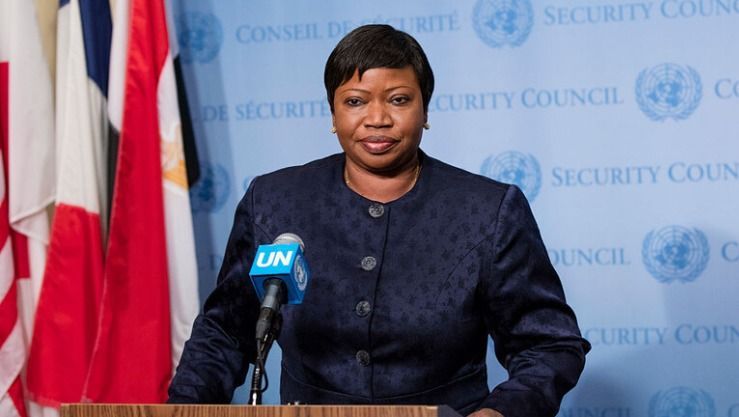Mossad's Covert Operations Against ICC
The recent revelations uncovering the former Mossad chief's threats against the ICC prosecutor have stirred international alarm.
Published May 30, 2024 - 00:05am

Image recovered from elbilad.net
The Guardian newspaper has shed light on a covert campaign led by the former Mossad chief Yossi Cohen, targeting the International Criminal Court's former Prosecutor, Fatou Bensouda, to deter investigations against Israel for alleged war crimes. This narrative is consistent across multiple news sources, including an investigative revelation by Alhurra, Shorouk News, and others.
These investigations reveal that several secret communications were made by Cohen to pressure the prosecutor to drop inquiries into war crimes in the occupied Palestinian territories. This complex saga, which began years before the ICC officially opened its investigation in 2021, reached its pinnacle when ICC's Prosecutor, Karim Khan, declared seeking arrest warrants against top Israeli officials on charges of war crimes in Gaza.
Israeli media, as reported by outlets like Yedioth Ahronoth, have expressed concerns that Israel's standing in the international community may worsen, and arrest warrants for its officials could be imminent. The accusations of espionage, intimidation, and harassment levied at Israel by these investigative reports paint a portrait of a nation willing to engage in dark tactics reminiscent of dictatorships to undermine the ICC and its officials.
The reported surveillance and threatening maneuvers signify Israel's continued violations and apparent impunity, bolstered by unwavering support from major powers like the United States. The international ramifications of these actions are profound, as they raise questions about the lengths to which a state might go to protect itself from international scrutiny and justice, and whether actions taken against the ICC could themselves constitute a crime under international law.
The impetus behind the alleged campaign stems from a broader backdrop of strained relations between Israel and the ICC. Since its establishment, Israel has never ratified the Rome Statute of the International Criminal Court, meaning it does not recognize the Court's jurisdiction. Nonetheless, Palestinians have sought international legal recourse for what they consider Israeli aggression and occupation, prompting the ICC to consider launching probes. The Guardian's report speaks volumes about the lengths allegedly taken by the former Mossad chief to forestall such legal pursuits.
The methods of the purported campaign have been under scrutiny from various international bodies and human rights organizations. Reports suggest that Cohen's strategies may have ranged from discreet diplomatic lobbying to more covert operations aimed at collecting incriminating evidence to discredit the ICC's proceedings or to exert personal pressure on the Prosecutor. These revelations are particularly alarming as they imply an intrusion into the sacrosanct principle of judicial independence and integrity, principles upon which the international justice system is founded.
The intensity of Cohen's alleged efforts indicates the paramount importance for Israel to prevent the progression of any ICC investigations. Reflecting on this, analysts point to the deep-seated fears within the Israeli political establishment about the potential impact of such inquiries on the country's military and political leadership, possibly leading to international arrest warrants that could limit their foreign travel and place Israel in an untenable global position.
Moreover, the Guardian's account sheds light on the wider geo-political implications of such moves. There is a growing concern that undermining the ICC could set a dangerous precedent where other countries facing similar accusations might employ comparable tactics to circumvent international law. This could ultimately weaken the ICC's mandate to investigate and prosecute the gravest crimes of concern to the international community, including genocide, war crimes, and crimes against humanity.
The reports also underscore the complexity of international law enforcement when powerful nation states are implicated. Israel's national security imperatives and its highly effective intelligence capabilities are juxtaposed against the international community's attempts to apply universal standards of justice. Critics argue that the reported actions against the ICC could send a chilling message to other nations and non-state actors, potentially inhibiting the pursuit of justice in other contexts around the world.
It is important to note that the allegations are in sharp contrast with Israel's official stance, which espouses a narrative of legal righteousness and moral responsibility. Israeli authorities argue that their military operates within the bounds of international law, taking all necessary precautions to avoid civilian casualties in the complex landscape of urban warfare and asymmetric conflict. The Israeli legal system, they say, is fully capable of investigating and prosecuting any misconduct by its own forces.
Despite these assertions, the series of reports have brought to the forefront the complicated relationship between Israel and the ICC. The emerging discourse is not just about a single investigation, but rather speaks to the broader issue of accountability within the international system. The alleged campaign, if proven to be true, represents a stark illustration of the challenges faced by international bodies in their efforts to uphold the rule of law without succumbing to the influence of powerful sovereign entities.
As the situation unfolds, the international community watches closely. Many nations and legal experts are calling for transparency and respect for the ICC's independence. Human rights groups, meanwhile, continue to document the situation on the ground in the occupied territories, advocating for victims' rights to be recognized and for justice to be served. The Guardian's reporting on this matter, along with corroborating investigations by additional outlets, serves to highlight the precarious state of global justice mechanisms and the relentless tug-of-war between national interests and international jurisprudence.








